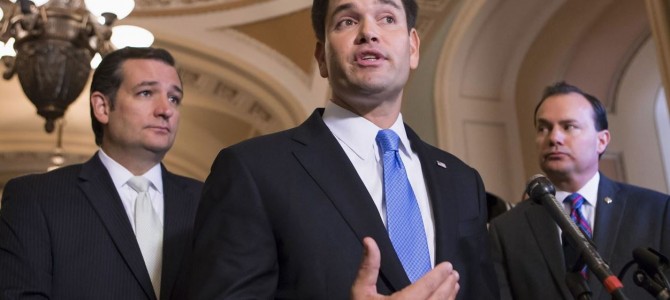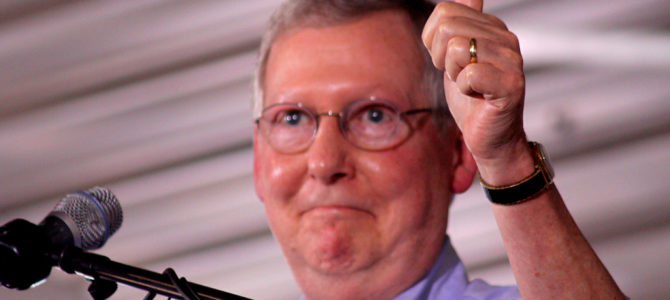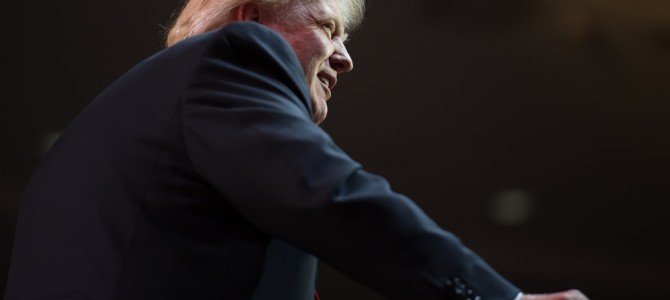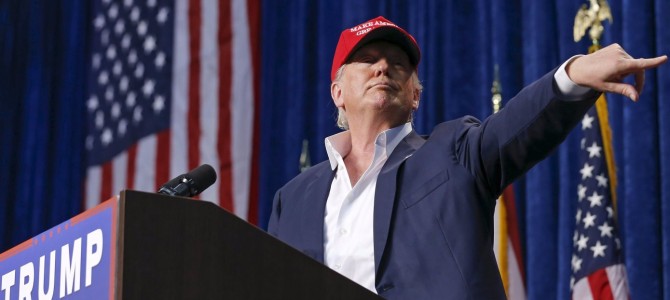
An interesting and somewhat unexpected argument is beginning to take shape in the context of the 2016 Republican Presidential Primary between the two most prominent Tea Party Senators running for the nomination – Ted Cruz and Marco Rubio. It is compelling because it demonstrates a real gap in terms of vision and priorities, but also because it speaks to very divergent views of the lessons of George W. Bush’s presidency, and how those lessons ought to be applied to the role of a future Commander in Chief.
It was technically Marco Rubio who fired the first shot – responding to Ted Cruz’s rising poll numbers with a series of ads slamming him for joining with the ACLU and others (er, supermajorities of others) to pass the USA Freedom Act, thereby weakening the NSA surveillance Rubio values so much and views as essential to protecting the homeland. From the NYT:
“With help from an allied group that is airing television ads in Iowa, Mr. Rubio is seeking to raise doubts on the right about Mr. Cruz’s toughness on national security — a potentially fatal vulnerability, should Mr. Rubio succeed, amid heightened concerns about terrorism. More quietly, he is trying to muddy the perception that Mr. Cruz is a hard-liner on immigration, asserting that Mr. Cruz supports “legalizing people that are in this country illegally.” … Mr. Rubio has taken to tying Mr. Cruz to liberal lightning rods like Senator Chuck Schumer of New York and the American Civil Liberties Union, claiming that Mr. Cruz worked with them “to harm our intelligence programs.” Or that Mr. Rubio is portraying Mr. Cruz as a hypocrite on immigration who backs “a massive expansion” of green cards and of the work visas for foreigners with college degrees and specialized skills.”
The ads and attacks led to an interview from Ted Cruz with Bloomberg – an interview he chose to do as opposed to saving these lines for the next debate stage, which is a notable development in itself. In this interview, he took dead aim at Rubio’s foreign policy, criticizing it from a perspective that painted it as irresponsible hawkishness without thought for the result. Note this portion from Cruz:
“If you look at President Barack Obama and Hillary Clinton and for that matter some of the more aggressive Washington neo-cons, they have consistently mis-perceived the threat of radical Islamic terrorism and have advocated military adventurism that has had the effect of benefiting radical Islamic terrorists,” he said… “In my view, we have no dog in the fight of the Syrian civil war,” he said, arguing that Rubio and Clinton “are repeating the very same mistakes they made in Libya. They’ve demonstrated they’ve learned nothing.”
What Did You Learn?
When Cruz says Rubio and Clinton have “learned nothing”, he is introducing what will likely be his core criticism of both candidates should he get into the one-on-one matchup most Washington pundits expect, and should he win the nomination after that. For Clinton, the obvious implication is that she has learned nothing from the fecklessness of President Obama’s lead from behind approach. But when he says Rubio and the “Washington neo-cons” have “advocated military adventurism” that has benefited “radical Islamic terrorists”, he is saying something different: he is accusing Rubio of not learning anything from the errors of the George W. Bush administration.
“What did you learn from the George W. Bush experience?” was not a question that the prior two nominees could answer in a clear way. But what Ted Cruz is doing here is indicating to the conservative base that he has heard their critiques of the Bush years, absorbed them, and has a definite viewpoint on how a future president should alter his approach – and he is arguing Marco Rubio has not.
The clash gives you a good example of a contrast with the lessons the conservative base took from past 15 years and the lessons Washington elites took from them. Think about the lessons the conservative base and the Tea Party, of which Marco was supposed to be a part, took from the Bush years, and they amount to something like this: that the Bush administration was too optimistic about spreading democracy, and ought to have instead focused on simply killing bad guys; that you can’t trust government when it comes to bailouts and cronyism; that Washington shouldn’t pick and choose winners and losers, but lower the burden of government on all Americans; that we’d gone too far in the direction of government surveillance of American citizens; that Washington was too beholden to Wall Street and big business; and that the Republican Party had wrongly gone down the path of using government to pass entitlements that benefit “our people” (via Medicare Part D and other steps), instead of rolling back the entitlement state.
Rather than distance himself from George W. Bush’s approach to policy, Rubio has largely embraced it. Consider: his embrace of the neoconservative agenda abroad, calling for the deployment of troops hither and thither and sounding inspirational notes that evoke the freedom agenda of the Bush second inaugural; His botched attempt at a bipartisan immigration reform, exactly the sort of thing Bush supported; His embrace of the reform conservative agenda at home, whose figures overlap significantly with those pushing compassionate conservatism for W. – a dramatic increase of child tax credits was part of the Bush agenda, too; His consistent push for strong Defense spending, rejecting the fiscal conservatism of the sequester; And his clashes with fellow Tea Party members over NSA surveillance, subsidies, immigration, and more. Together, they all paint a picture of an agenda that seems to have much more in common with George W. Bush’s than you might expect from someone who is supposed to be part of the new innovative wave of Tea Party politicians.
Rubio’s Miscasting
Of course, it’s no secret that Rubio was always miscast as a Tea Partier. He endorsed Mike Huckabee in 2008 – he was his statewide chair. He ran against Charlie Crist more as a social conservative good government reformer than a bold government-slashing Tea Partier. But Tea Party opposition to Crist gave him fuel, and Rubio wisely played it up. Has he been playing that game ever since? Because on the face of it, it looks like the lessons Marco took from 2000-2008 were basically: W. was right.
Would Rubio’s nomination indicate that the Republican Party had changed, or that it is fundamentally about more of the same, just with a younger, better face? Would it indicate that they have not learned many lessons from the George W. Bush years? Or would it possibly indicate the lesson they’ve learned is all about Bush’s style, not substance? It very well could be that Republicans will nominate the one guy whose answer to the question “what did you learn from George W. Bush” basically amounts to: “We just needed a better messenger.”
The cynical view of electoral politics is that good messengers usually do trump policy (SWIDT). But Ted Cruz is not a bad messenger when it comes to the Republican Base, and he seems to have taken a much larger number of lessons from the George W. Bush years. He seems to believe the Bush years taught us that the public is neither pro- or anti-interventionist, nor are they pro- or anti- democracy agenda – they are mostly just for winning, by which they mean and destroying our enemies in a classic Jacksonian way. Big or small, nearby or far away, ideological or realpolitik, Americans are basically fine with any war we can win quickly and reject wars that are long slogs without a clear enemy or point of victory.
Cruz’s Intentional Positioning
Cruz’s positioning is obvious and intentional, but it also might work. It has more fire and skepticism than Rubio’s optimism, and the dual attack on Rubio and Clinton works well as a frame. It’s also enormously helpful for Cruz to have Trump in the race, because it thoroughly undermines the perspective that says “oh, you’re a dove, you’re an isolationist for not wanting to destroy Assad/Qaddafi”, because if there’s anything Trump is, he is not a weakling. (He’ll take on those Muslims with the weapons that matter most today – sick Tweets.)
The most interesting thing about Ted Cruz is that on paper, on public policy issues, he is almost indistinguishable from a traditional conservative senator. There are a few tweaks, sure. But stuff like the USA Freedom Act or credits vs. deductions on Obamacare replace do not make for a Goldwater-Rockefeller split. There is not that much of a gap, though where there are gaps, he will happily exploit them – see Cruz trolling Rubio in last debate with a Chekhov’s gun line about sugar subsidies, and his nod to the libertarian flank, which is mostly just a nod, has dramatically undercut Rand Paul.
Cruz’s secret weapon in 2016 may turn out to be that he might not have to moderate all that much in the general election. He is smart enough to make moderate-ish sounding arguments for very conservative positions. He’s probably not as good at it as Rubio would be, but both are probably “good enough” on that score to win. Acela corridor folks have this sense that the country sees Cruz the way Senate Republican leaders see Cruz, which is a characteristically idiotic thing to believe, so of course they believe it fully. It is also not the way he is viewed in Iowa or elsewhere around the country – and that is why he has a path.
Is Rubio a Better General Election Candidate?
People who maintain that at the end of the day Rubio is a better general election candidate could be right, and simply supporting a party’s best general election candidate isn’t a terrible strategy as such. But the establishment case against Cruz is based on two things – they hate him, and they think he can’t win. I think the latter is false. Cruz is not the best equipped candidate for a general election, of course. But if things keep going the way they’re going, he could absolutely win. Hillary Clinton is a flawed candidate running to replace an eight-year incumbent, and sometimes those candidates win and sometimes they lose, and usually it’s based on how people feel things are going – not how they feel about the challenger. Cruz may not inspire the way Rubio does, but where he lacks the Floridian’s sensitive nature, he adds an ability to debate that is second to no one in the field.
Beating Rubio will be a challenge for Cruz if the field clears too early, though, because there is one critical way that Rubio is different from George W. Bush: he is better at politics. Back in 2007, Democrats who weren’t 1960s era feminists and Clinton cronies wanted to support Obama. But they had reasonable concerns about electability. Once Obama demonstrated that he was electable, after Iowa, the reasons for liberals not to support him quickly evaporated. The difference in 2016 is that Rubio isn’t Bush – Cruz could’ve run the Obama game on Bush, easily. But Rubio has a stronger message and more inspirational story, and that one difference in his approach could be very important down the stretch.
Of course, it’s possible that those who believe Rubio to be a once-in-a-generation Reaganesque political talent are correct. He is for most people innately likeable in a way that Ted Cruz, even for those who agree with him, is not. The contrary point in Cruz’s favor is that as much as he lags Rubio in likability, this is actually in context a key asset to his campaign. The entire narrative to his case for the presidency is that Washington hates him – that he, like Trump, is a traitor to his class – Trump to the elite billionaires of the universe, Cruz to the Republican establishment that thought this Ivy Leaguer would grow in office to be more like them. One of the lessons that Cruz has taken from the Bush experience is that his tenure saw the GOP establishment (and D.C. generally) go from unpopular to downright hated. Washington insiders still talk as though the basic architecture of public opinion holds – that DC is everyone’s favorite punching bag, but it’s not bad enough to bring about real change. The political disruption we have seen post-Bush and Trump’s current persistence call that confidence into question. Cruz’s calculus for 2016 could be described as this: are the American people willing to give the DC establishment one more chance, or was 2012 their last hurrah?
Even assuming Cruz is wrong, there is a general election problem Rubio could face which may lead people to overrate him now: does he have enough populism to go along with his natural political skills? Will he hold on to the white working class voters who today clamor for Trump, but will need to be held within the Republican coalition to win Iowa, Ohio, and Pennsylvania? And is it a problem that Cruz, debater that he is, can conceivably be expected to hit Hillary Clinton on her foreign policy missteps from angles she doesn’t anticipate and isn’t comfortable with, where she can just sit back, look at Rubio, lean in to the mic, and say with a low cackle: “Bush”?
But for the time being, it is just the nomination at stake. Ted Cruz is gambling that the party has learned the same lessons the conservative base has from the George W. Bush years. Marco Rubio is gambling that whatever lessons you learned, they won’t matter if the messenger is good enough.









